 |
 |
 |
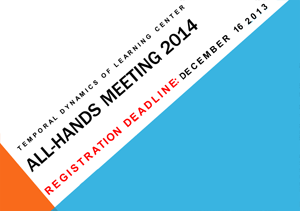 8th Annual TDLC 8th Annual TDLC
All-Hands Meeting (AHM)!
This meeting is an annual gathering of TDLC members and invited guests.
General Session:
Fri.- Sat., Feb. 7-8, 2014;
Fellows Retreat:
Thursday, Feb. 6, 2014
Location: San Diego Supercomputer Center East
All TDLC investigators are strongly encouraged to attend and invite one trainee. Trainees who attend are asked to present a poster or a 15 minute presentation. Register Now!  More Information More Information  |

TDLC at the 43rd annual meeting of
the Society for Neuroscience (SfN)
The Annual SfN Neuroscience Meeting is the largest neuroscience meeting in the nation. Over 30,000 colleagues from more than 80 countries gather to discuss global neuroscience. Many TDLC investigators and trainees attended this year's event in San Diego on November 9-13, 2013. More 
TDLC Summer Internships
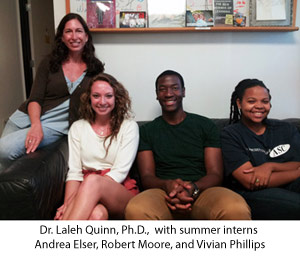 TDLC is in a key position to offer training to high school, undergraduate, and graduate students through various internship programs. Andrea Chiba recently welcomed three summer interns – Robert Moore, Vivian Phillips, and Andrea Elser – who eagerly share details of their experience. Scientist Laleh Quinn, who is leading the team's project, has been an invaluable mentor to the interns. More TDLC is in a key position to offer training to high school, undergraduate, and graduate students through various internship programs. Andrea Chiba recently welcomed three summer interns – Robert Moore, Vivian Phillips, and Andrea Elser – who eagerly share details of their experience. Scientist Laleh Quinn, who is leading the team's project, has been an invaluable mentor to the interns. More
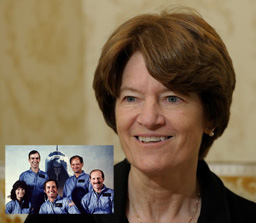 Presidential Medal of Freedom to be Awarded to Two UC San Diego Professors (8/9/13) Presidential Medal of Freedom to be Awarded to Two UC San Diego Professors (8/9/13)
Sally Ride, former professor emeritus in physics and first woman in space, will be honored, posthumously, with the Presidential Medal of Freedom, the nation's highest civilian honor. This news is especially exciting for TDLC, as Sally Ride founded and led the educational company, Sally Ride Science, which officially joined TDLC as a corporate partner this year. Mario Molina, distinguished professor of chemistry and biochemistry at UC San Diego, will also receive the Presidential Medal of Freedom. More about the Awards
What is the interaction between attention and learning?
 TDLC investigator Gedeon Deak and co-organizers Rachel Wu and Richard Aslin (both University of Rochester) and Rebecca Nako (University of London) addressed this important question in the recent event: The “Learning to Attend, Attending to Learn Workshop: Neurological, Behavioral, and Computational Perspectives.” The aim of this gathering, held in San Diego on Nov. 6-7, 2013, was "to encourage cross-talk among researchers from different fields asking the same questions." This interdisciplinary approach provided critical insights and opportunities for interaction and collaboration. More TDLC investigator Gedeon Deak and co-organizers Rachel Wu and Richard Aslin (both University of Rochester) and Rebecca Nako (University of London) addressed this important question in the recent event: The “Learning to Attend, Attending to Learn Workshop: Neurological, Behavioral, and Computational Perspectives.” The aim of this gathering, held in San Diego on Nov. 6-7, 2013, was "to encourage cross-talk among researchers from different fields asking the same questions." This interdisciplinary approach provided critical insights and opportunities for interaction and collaboration. More
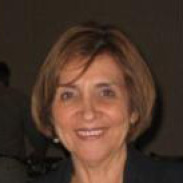
From the Lab to the Classroom: Continuing the Discussion
The Distinguished Educator Advisory Panel - San Diego, a component of The Educator Network, met on September 13 with continued discussion of exploring how translation from the science laboratory to the classroom can be accomplished. Using the David Daniels Model of Steps to Translation, the group discussed with Ryan Gallagher and Paula Tallal, a research study, “Social/emotional function, academic skills, and brain maturation during adolescence: Focus on adaptive interventions,” that took place three years ago with Ryan’s students. More
|
|

|
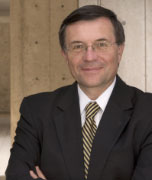 Terry Sejnowski featured in recent articles on the BRAIN Initiative: Terry Sejnowski featured in recent articles on the BRAIN Initiative:
 A public hearing, "A Mindful Approach to the BRAIN Initiative," was held Oct. 4, 2013, at UC San Diego, to explore the state's role in supporting the BRAIN Initiative, first unveiled by the Obama Administration in April 2013. TDLC's Dr. Terry Sejnowski attended the event, along with Senate Majority Leader Ellen M. Corbett, Ralph Greenspan (head of the recently established Center for Brain Activity Mapping (CBAM)), and UCSD Chancellor Pradeep K. Khosla. More A public hearing, "A Mindful Approach to the BRAIN Initiative," was held Oct. 4, 2013, at UC San Diego, to explore the state's role in supporting the BRAIN Initiative, first unveiled by the Obama Administration in April 2013. TDLC's Dr. Terry Sejnowski attended the event, along with Senate Majority Leader Ellen M. Corbett, Ralph Greenspan (head of the recently established Center for Brain Activity Mapping (CBAM)), and UCSD Chancellor Pradeep K. Khosla. More 
 National Neuroscience Effort Zooms In On Brain Circuits National Neuroscience Effort Zooms In On Brain Circuits
(KPBS, Sept. 17, 2013)
The article also links to
the nine broad research priorities of the U.S. brain-mapping initiative, made by the US National Institutes of Health (NIH), which were released on September 16, 2013. More
 Accelerating Brain Research with Supercomputers Accelerating Brain Research with Supercomputers
(August 5, 2013, HPC Wire)
 Decoded: How brain remains focused on long-term goals Decoded: How brain remains focused on long-term goals
(August 5, 2013, FirstPost)
TDLC's Howard Poizner and Team are Featured in Recent News!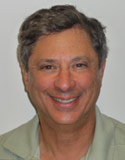
 A study by Dr. Poizner and colleagues will be featured on the cover of Neuroscience (Dec 16th issue): Patients with Parkinson's disease show impaired online control and reduced eye-hand span when reaching to grasp objects (Neuroscience, 2013, 254, 205-221). Authors: Lukos, J., Hernandez, M., Tunik, E., Hillyard, S., and Poizner, H. A study by Dr. Poizner and colleagues will be featured on the cover of Neuroscience (Dec 16th issue): Patients with Parkinson's disease show impaired online control and reduced eye-hand span when reaching to grasp objects (Neuroscience, 2013, 254, 205-221). Authors: Lukos, J., Hernandez, M., Tunik, E., Hillyard, S., and Poizner, H.
 In the San Diego Union Tribune: In the San Diego Union Tribune:
Hot on the trail of Parkinson's (Sept. 2013)
Dr. Poizner discusses his Parkinson's research program with Gary Robbins of the U-T San Diego. More
 On the cover of the August issue of the journal Neuroscience: Reaching to kinesthetically defined targets in Parkinson's disease: Effects of deep brain stimulation therapy On the cover of the August issue of the journal Neuroscience: Reaching to kinesthetically defined targets in Parkinson's disease: Effects of deep brain stimulation therapy
 In The Journal of Neuroscience (Sept. 18, 2013): Human Cortical θ During Free Exploration Encodes Space and Predicts Subsequent Memory In The Journal of Neuroscience (Sept. 18, 2013): Human Cortical θ During Free Exploration Encodes Space and Predicts Subsequent Memory
 Poizner Lab Receives Grant from ONR (Sept. 2013) Poizner Lab Receives Grant from ONR (Sept. 2013)
Dr. Howard Poizner recently received an equipment grant ($500k) from ONR, entitled, 'Hybrid Optical-Electrical Brain Imaging of Multiple Agents Acting in Dynamic Environments.' The grant will enable the Poizner Lab/Brain Dynamics-Motion Capture Lab to extend their capabilities in simultaneously recording brain activity and movement in complex environments.
 Using Music to Close the Academic Gap Using Music to Close the Academic Gap
TDLC Investigator John Iversen is featured a recent article in The Atlantic (Oct. 9), which discusses the SIMPHONY project and its goal to study the impact of intense music ensemble training on the brain development of underserved children in the Chula Vista school district. More 
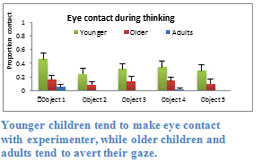 Learning to Solve Problems Learning to Solve Problems
It may not be surprising to know that when faced with a problem, adults employ different methods to solve it. But now a tight-knit group of TDLC researchers is uncovering the emergence at young ages of the development and individual differences in problem solving.
The ongoing project is led by San Diego State's Judy Reilly, working together with collaborators Marian Bartlett and Gwen Littlewort, UC San Diego, and Zewelangi Serpell, Virginia Commonwealth University. In two years and counting, these women of science have determined that style differences stem from cognitive, social and biological differences and reflect independent developmental trajectories, In other words, just as kids grow differently in other aspects, so do their problem-solving skills develop. More
 Study finds a patchwork of genetic variation in the brain Study finds a patchwork of genetic variation in the brain
TDLC Investigator Fred Gage was part of a research team at The Salk Institute for Biological Studies that used single-cell sequencing to show that "the genomic structures of individual neurons differ from each other even more than expected." Dr. Gage explains, "Contrary to what we once thought, the genetic makeup of neurons in the brain aren't identical, but are made up of a patchwork of DNA," The findings were published Nov. 1 in Science. More
Publications by Gedeon Deak and TDLC Trainees
 Several recent publications from the Cognitive Development Lab at UCSD, directed by investigator Gedeon Deak, were co-authored by TDLC trainees Kaya de Barbaro and Marybel Robledo. The papers describe findings and methods relating infants' temporal processing of social and non-social information to the development of language and communication skills. Click here to learn more about the publications Several recent publications from the Cognitive Development Lab at UCSD, directed by investigator Gedeon Deak, were co-authored by TDLC trainees Kaya de Barbaro and Marybel Robledo. The papers describe findings and methods relating infants' temporal processing of social and non-social information to the development of language and communication skills. Click here to learn more about the publications
- TDLC's Gedeon Deák featured in the UC San Diego Triton Alumni Magazine (Sept. 2013)
In a recent paper published in the Journal of Experimental Child Psychology (2013), TDLC investigator Gedeon Deák and a Stanford colleague in pediatrics (Toney) show that young children “learn
pictogram associations or facts as quickly or more quickly than they
learn words. This challenges the assumption of developmental
psychologists and lay-people alike that children are 'little sponges' for learning words and language."
 The publication The publication  Triton article Triton article
Preterm Babies at Risk for Later Cognitive Difficulties (8/14/13)
A $3 million NIH grant was recently awarded to researchers at UC San Diego to study the impact of preterm birth on early cognitive development and academic measures. TDLC investigators Terry Jernigan, Tim Brown and Judy Reilly are part of this multidisciplinary team of investigators. They will utilize MRI imaging techniques to study links between affected brain areas and pathways and levels of performance on a set of neurocognitive and math functions. More 
|
|
|
|
| |
 |

Featured Scientist: Marlene Behrmann
Email: behrmann@cmu.edu
You were part of a recent study that found that "High-functioning autistic people could excel at certain tasks." Can you please explain?
I was senior author of a study published by researchers at Carnegie
Mellon University and the University of Pittsburgh. This study
focussed on the ability of adults with autism to perform a luggage
screening task (like that performed by TSA agents at airports).
We
were able to demonstrate statistically that high-functioning
individuals with autism stayed more true to the task compared with
people who became distracted more easily: Whereas high-functioning
autistic men were just as accurate and almost as fast as non-autistic
people in finding weapons in X-ray images of baggage, their
performance improved as time went on, particularly in correctly
identifying bags that had no weapons. In the study, the 13 men
without autism got worse as time went on at identifying bags that had
no weapons, while the autistic men actually got better.
We offer several possible reasons for this: Autistic people may just
be better at visual searches; they "may not get bored as quickly with
an individualistic detail-oriented task;" and they may be more
anxious about failing.
"It is not difficult to describe tasks that present disproportionate
hurdles for individuals with [autism]," the authors wrote. "However,
a more optimistic view -- and the one that we take in this paper --
is that [autistic] individuals have unique abilities that can give
them an advantage over others at performing some tasks."
Article: TSA may have the perfect job for autistic workers
Study: High-functioning autistic people could excel at certain tasks
(Oct. 9, 2013, Pittsburgh Post-Gazette) More 
|
|
This message was sent from:
The Temporal Dynamics of Learning Center (TDLC.UCSD.EDU)
University of California, San Diego,
9500 Gilman Drive, La Jolla, CA 92093
To learn more about TDLC, please visit us on the web at: TDLC.UCSD.EDU
Please contact webmaster@tdlc.ucsd.edu to unsubscribe.
TDLC is a Science of Learning Center (SLC),
one of six SLCs funded by the National Science Foundation. NSF grant #SBE-0542013
|
|
 |
 |
 December 2013 December 2013
|
|
 
TDLC's The Educator Network
Recent
Forum Topic:
Using Spatial Thinking to Teach Science, Math and Social Studies
This article, written by one of our Science of Learning partners, Nora Newcombe, gives some great insights into what teachers can do to help students use spatial thinking especially in math, science and social studies. Click here to read the article.
Announcing Three New IMBES Awards
The International Mind Brain Education Society (IMBES) is pleased to announce a call for nominations for three new awards in the field of Mind, Brain and Education. More 
|
|
|
 |
 |
Music Training in Childhood Offers Brain Benefits Throughout Life
(Time, Nov. 6, 2013)
Researchers at Northwestern University connected music lessons in childhood to the way the brain responded to speech later in life.
Read More
|
 |
Exercise is good for moms-to-be -- and baby's brain, study finds
(Nov. 10, 2013)
A new study finds that 20 minutes of exercise, three times a week, improves a newborn's brainpower.
Read More
|
 |
One, Two, Buckle My Shoe: International Study Documents Importance of Language to Learning Math
(UCSD News Center,
Oct. 28, 2013)
Read More
|
 |
Knowledge for earnings' sake:
Good teachers have a surprisingly big impact on their pupils' future income
(The Economist,
Oct. 12, 2013)
"Though not easy, school reforms that identify good teachers and assign them to struggling pupils should pay off handsomely."
Read More
|
 |
A good night's sleep scrubs your brain clean, researchers find (NBC News Health, Oct. 17, 2013)
A new study suggests that a good night's sleep leaves you feeling sharp and refreshed because a newly discovered system that scrubs away neural waste is mostly active when you're at rest.
Read More
|
 |
Scientists Create New Memories by Directly Changing the Brain
(ScienceDaily, Sept. 10, 2013)
Read More
|
 |
Babies May Remember Words Heard Before Birth
Read More
|
 |
Unborn babies are hearing you, loud and clear
Read More
|
 |
Taking out half a kid's brain can be best option to stop seizures, research confirms
(Today Health 8/13)
Read More
|
 |
Study offers clues about how athletes' brain disease (CTE) begins
(CNN, Aug. 2013)
Read More
|
 |
Early Spatial Reasoning Predicts Later Creativity and Innovation, Especially in STEM Fields
(ScienceDaily,
July 15, 2013)
Read More
|
 |
It's not your fault you're tone-deaf. It's your brain's
A recent small study published in Brain found that the deficits seen in amusia (the inability to perceive nor produce musical sequences accurately) originate in a region of the brain called the auditory cortex.
(NBC Health, 2013)
Read More
|
 |
Biochemical Mapping Helps Explain Who Will Respond to Antidepressants
Duke Medicine researchers have identified biochemical changes in people taking antidepressants -- but only in those whose depression improves.
(July 18, 2013)
Read More
|
 |
Good Vibrations: Mediating Mood Through Brain Ultrasound
Ultrasound vibrations applied to the brain may affect mood, UA researchers have discovered.
ScienceDaily, July 18, 2013) Read More
|
 |
Multiple Sclerosis Research Could Help Repair Damage Affecting Nerves
New treatments that could help slow the progression of multiple sclerosis could be a step closer due to research by Edinburgh University.
(BBC News,
July 21, 2013)
Read More
|
 |
Virtual Brain Capable Of Daydreaming Just As Humans Do
A team of international researchers, led by Washington University School of Medicine in St. Louis, has created a virtual model of the brain capable of daydreaming like humans do.
Read More
|

|
During REM sleep, certain brain chemicals keep our bodies still so that we don't act out what's going on in the brain
During rapid eye movement - or REM - sleep (the most dream-filled phase of sleep), the voluntary muscles of the body — arms, legs, fingers, anything that is under conscious control — are paralyzed. This prevents our bodies from acting out what's going on in the brain. Researchers have discovered a mix of brain chemicals that keep the body still in sleep. This knowledge could point to new treatments for the sleep disorders, especially something called REM behavior disorder. More
(reference:
LiveScience) |
|
|
 |

![]()
